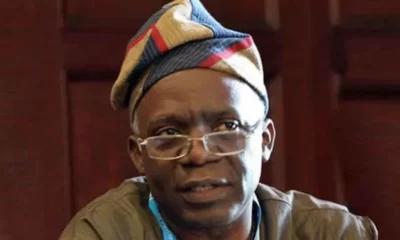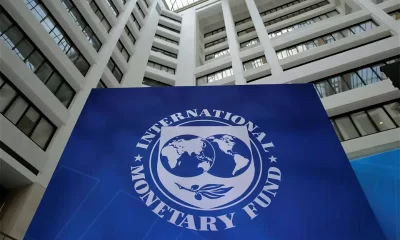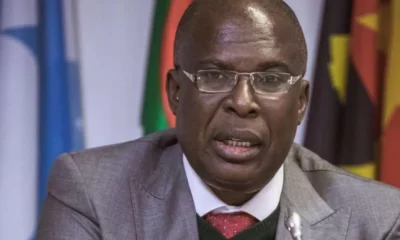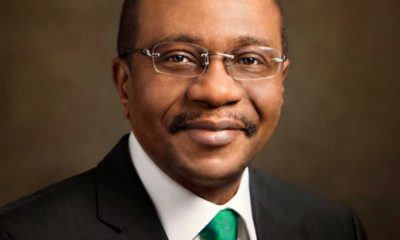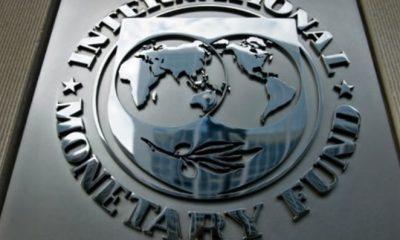Business
IMF Retains Nigeria’s Economic Growth Forecast At 3.2%
Published
9 months agoon
By
Editor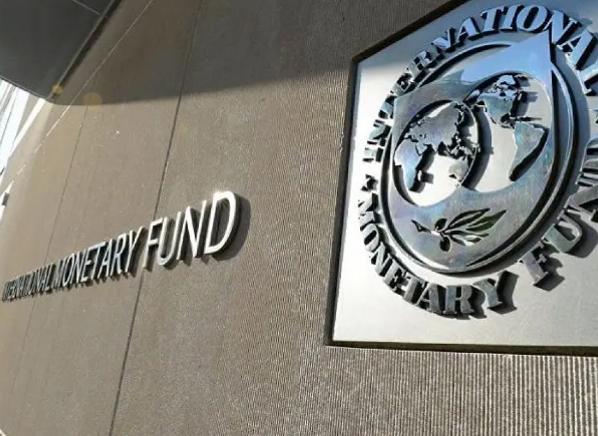
The International Monetary Fund, IMF has retained its 3.2 forecast for Nigeria’s economic growth in 2023.
Meanwhile, the IMF lowered its forecast for Sub-Saharan economic growth in 2023 by 0.1 percentage point to 3.5 per cent.
The Fund however raised its forecast for global economic growth in 2023 by 0.2 percentage points to 3.5 per cent.
The forecasts were disclosed in the IMF World Economic Outlook, WEO Update, July, titled “Near-Term Resilience, Persistent Challenges.”
The IMF said: “Global growth is projected to fall from 3.5 percent in 2022 to 3.0 percent in both 2023 and 2024 on an annual average basis. Compared with projections in the April 2023 WEO, growth has been upgraded by 0.2 percentage point for 2023, with no change for 2024.
READ ALSO: VIDEO: Youths Burn Down Davido’s Poster In Maiduguri, Demand Apology Over ‘Offensive’ Video
“The forecast for 2023–24 remains well below the historical (2000–19) annual average of 3.8 percent. It is also below the historical average across broad income groups, in overall GDP as well as per capita GDP terms.
“Advanced economies continue to drive the decline in growth from 2022 to 2023, with weaker manufacturing, as well as idiosyncratic factors, offsetting stronger services activity. In emerging market and developing economies, the growth outlook is broadly stable for 2023 and 2024, although with notable shifts across regions.
“On a year-over-year basis, global growth bottomed out in the fourth quarter of 2022. However, in some major economies, it is not expected to bottom out before the second half of 2023.
“In sub-Saharan Africa, growth is projected to decline to 3.5 percent in 2023 before picking up to 4.1 percent in 2024. Growth in Nigeria in 2023 and 2024 is projected to gradually decline, in line with April projections, reflecting security issues in the oil sector.
READ ALSO: JUST IN: CBN Raises Interest Rate
“In South Africa, growth is expected to decline to 0.3 percent in 2023, with the decline reflecting power shortages, although the forecast has been revised upward by 0.2 percentage point since the April 2023 WEO, on account of resilience in services activity in the first quarter.”
Advising governments on policy priorities, the IMF said: “In most economies, the priority remains achieving sustained disinflation while ensuring financial stability.
“Therefore, central banks should remain focused on restoring price stability and strengthening financial supervision and risk monitoring. Should market strains materialize, countries should provide liquidity promptly while mitigating the possibility of moral hazard.
“They should also build fiscal buffers, with the composition of fiscal adjustment ensuring targeted support for the most vulnerable. Improvements to the supply side of the economy would facilitate fiscal consolidation and a smoother decline of inflation toward target levels.”
You may like


VIDEO: Reject IMF, World Bank Offers – Falana Cautions FG


IMF Denigrates Nigeria’s Economic Growth


Bayelsa Guber: Why Court Disqualified APC Candidate, Sylva


Why We’re Happy With IMF Growth Forecast For Nigeria – Emefiele


Why Debt Burden Will Worsen For Nigeria, Other Low Income Countries — IMF


IMF Warns Global Inflation Could Stay High Until 2025

The Central Bank of Nigeria (CBN) started fresh and direct sales of US dollars at N1,021 per dollar to Bureau De Change operators.
Nigeria’s apex bank disclosed this in a circular signed by its Director of Trade and Exchange Department Hassan Mahmud.
“We write to inform you of the sale of $10,000 by the Central Bank of Nigeria (CBN) to BDCs at the rate of N1,021/$1. The BDCs are in turn to sell to eligible end users at a spread of NOT MORE THAN 1.5 percent above the purchase price,” the circular posted on its website read.
READ ALSO: Tinubu Unveils African Counter-Terrorism Summit
“ALL eligible BDCs are therefore directed to commence payment of the Naira deposit to the underlisted CBN Naira Deposit Account Numbers from today, Monday, April 22, 2024, and submit confirmation of payment, with other necessary documentations, for disbursement of FX at the respective CBN Branches.”
CBN’s move is coming as the naira is recording a slight depreciation against the dollar after weeks of gains.
In late March, the bank also sold $10,000 to each of the eligible Bureau De Change (BDC) operators in the country at the rate of N1,251/$1.
READ ALSO: Mixed Reactions Trail Video Of Couple’s Customised N200 Notes
Like in the most recent sales, it warned BDCs against breaching terms of the dollar sales, vowing to sanction defaulters “including outright suspension from further participation in the sale”.
The fortunes of the naira have fallen sharply since President Bola Tinubu took over in May. Inflation figures have reached new highs and the cost of living hitting the rooftops.
Nigeria’s currency slid to about N1,900/$ some months ago at the parallel market. But in recent weeks, it has gained against the dollar.
The Nigerian authorities have also doubled down on their crackdown against cryptocurrency platform Binance and illegal BDCs.
On March 1, the CBN revoked the licences of 4,173 BDCs over compliance failures.
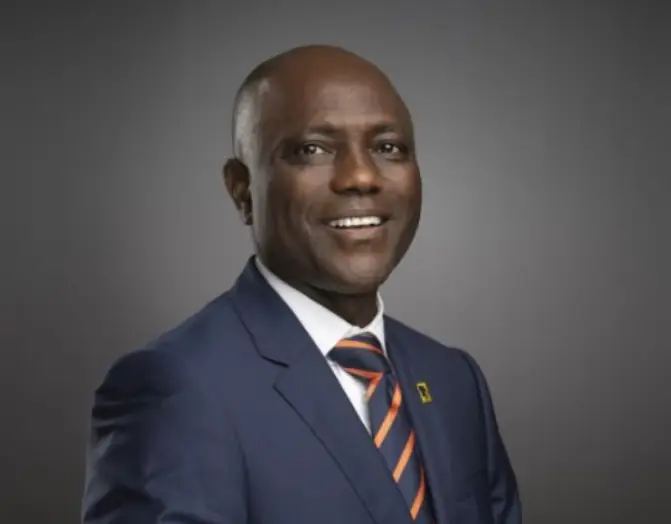
Olusegun Alebiosu has been appointed as the Acting Managing Director/Chief Executive Officer of First Bank of Nigeria Limited (FirstBank Group), effective April 2024.
Alebiosu steps into this pivotal role from his previous position as the Executive Director, Chief Risk Officer, and Executive Compliance Officer, a position he held since January 2022.
Alebiosu brings to the helm of FirstBank over 28 years of extensive experience in the banking and financial services industry. His expertise spans various domains including credit risk management, financial planning and control, corporate and commercial banking, agriculture financing, oil and gas, transportation, and project financing.
READ ALSO: JUST IN: Access Holdings Names New Acting CEO
Having embarked on his professional journey in 1991 with Oceanic Bank Plc. (now EcoBank Plc.), Alebiosu has held several notable positions in esteemed financial institutions.
Prior to joining FirstBank in 2016, he served as Chief Risk Officer at Coronation Merchant Bank Limited, Chief Credit Risk Officer at the African Development Bank Group, and Group Head of Credit Policy & Deputy Chief Credit Risk Officer at United Bank for Africa Plc.
Alebiosu’s academic credentials further enrich his professional profile. He is an alumnus of the Harvard School of Government and holds a Bachelor’s degree in Industrial Relations and Personnel Management. Additionally, he obtained a Master’s degree in International Law and Diplomacy from the University of Lagos, as well as a Master’s degree in Development Studies from the London School of Economics and Political Science.
READ ALSO: Meet Newly Appointed Union Bank CEO
A distinguished member of various professional bodies, including the Institute of Chartered Accountants (FCA), Nigeria Institute of Management (ANIM), and Chartered Institute of Bankers of Nigeria (CIBN), Alebiosu is renowned for his commitment to excellence and ethical practices in the banking sector.
Beyond his professional endeavors, Alebiosu is known for his passion for golf and adventure. He is happily married and a proud parent.
With Alebiosu’s appointment, FirstBank of Nigeria Limited anticipates continued growth and innovation under his leadership, reinforcing its position as a leading financial institution in Nigeria and beyond.
Business
CBN Gives New Directive On Lending In Real Estate
Published
2 weeks agoon
April 17, 2024By
Editor
The Central Bank of Nigeria, CBN, has released a new regulatory directive to enhance lending to the real sector of the Nigerian economy.
The directive, issued on April 17, 2024, with reference number BSD/DIR/PUB/LAB/017/005 and signed by the Acting Director of Banking Supervision, Adetona Adedeji, signifies a notable shift in the bank’s policy towards a more contractionary approach.
In line with the new measures, the CBN has reduced the loan-to-deposit ratio by 15 percentage points, down to 50 per cent.
This move aligns with the CBN’s current monetary tightening policies and reflects the increase in the Cash Reserve ratio rate for banks.
READ ALSO: JUST IN: CBN Gov Sacks Eight Directors, 32 Others
The LDR is a metric used to evaluate a bank’s liquidity by comparing its total loans to its total deposits over the same period, expressed as a percentage.
An excessively high ratio may indicate insufficient liquidity to meet unexpected fund requirements.
All Deposit Money Banks are now mandated to adhere to this revised LDR.
The CBN has stated that average daily figures will be utilised to gauge compliance with this directive.
Furthermore, while DMBs are encouraged to maintain robust risk management practices in their lending activities, the CBN has committed to continuous monitoring of adherence and will adjust the LDR as necessary based on market developments.
READ ALSO: JUST IN: CBN Increases Interest Rate To 24.75%
Adedeji has called on all banks to acknowledge these modifications and adjust their operations accordingly. He emphasised that this regulatory adjustment is anticipated to significantly influence the banking sector and the wider Nigerian economy.
The circular read in part, “Following a shift in the Bank’s policy stance towards a more contractionary approach, it is crucial to revise the loan-to-deposit ratio policy to conform with the CBN’s ongoing monetary tightening.
“Consequently, the CBN has decided to decrease the LDR by 15 percentage points to 50 per cent, proportionate to the rise in the CRR rate for banks.
“All DMBs must maintain this level, and it is advised that average daily figures will still be applied for compliance assessment.
“While DMBs are urged to sustain strong risk management practices concerning their lending operations, the CBN will persist in monitoring compliance, reviewing market developments, and making necessary adjustments to the LDR. Please be guided accordingly.”

JUST IN: WASSCE Begins April 30
Jubilation As Obaseki Raises Minimum Wage To N70,000

OPINION: Sending Ooni Of Ife To Tinubu
Trending

 News5 days ago
News5 days agoDrama! Supporters Of Yahaya Bello Perform Rituals to Prevent His Arrest By EFCC [Video]

 News4 days ago
News4 days agoEdo: FRSC Threatens Sanction On Truck Drivers Loading Goods, Passengers Together

 Headline4 days ago
Headline4 days agoSaudi Arabia Opens First Alcohol Store, Nigerian Muslims React

 Headline4 days ago
Headline4 days agoVIDEO: Meet Nigerian Pastor Who Predicted World Will End April 25

 News4 days ago
News4 days ago243 Passengers Cheat Death As Air Peace Plane Makes Emergency Landing At Lagos Airport

 Metro4 days ago
Metro4 days agoJUST IN: Four-year-old Boy Dies In Abuja School, Parents Suspect Foul Play

 Metro4 days ago
Metro4 days agoJUST IN: Protesters Storm APC Secretariat, Demand Ganduje’s Resignation

 Politics4 days ago
Politics4 days agoEdo Guber: PDP Unveils 200-member Campaign Council

 News4 days ago
News4 days agoEFCC Withdraws Appeal Against Former Kogi Gov, Bello

 News3 days ago
News3 days agoDSTV Price Hike: Five Alternatives Nigerians Are Opting For
